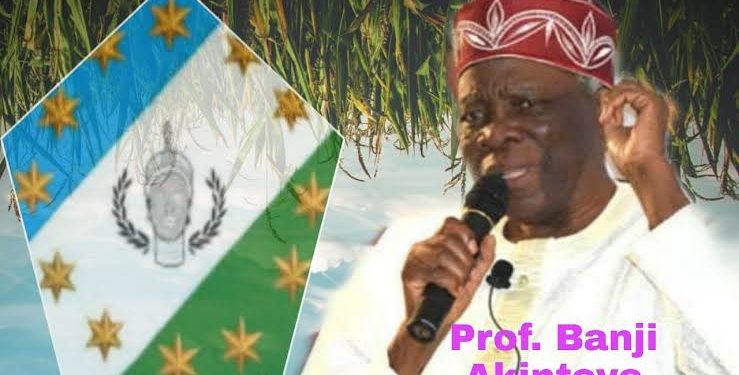https://www.facebook.com/itanyoruba1/videos/2940640726178752/
•Wait for Facebook video to load above
The Umbrella body of Yoruba Self-Determination Groups, Ilana Omo Oodua, has released a manual for any persons willing to join or champion the Yoruba Nation agitation.
The 37-page manual, exclusively obtained by The PUNCH, contained the dos and don’ts for agitators, including the reason for the agitation.
This is coming barely three days after a Yoruba Nation activist, Sunday Igboho was arrested at the airport in Benin’s capital Cotonou.
Signed by its leader, Professor Emeritus Banji Akintoye, the manual also contained conditions that must be met when holding a rally or protest.
It explained that the need for collaboration between Yoruba Nation and other self-determination groups across the world.
“The following is a guide or manual for the use of all Yoruba patriots engaged in the struggle for Yoruba self-determination. It supplies to all supporters of the self-determination struggle the kinds of information that they will need to prosecute the struggle; and it supplies guides to the struggle’s strategies and methods,” part of the manual read.
The manual also provided the basic details of the Yoruba nation’s reasons, part of which were given as “the Yoruba people’s devastating experiences in Nigeria, the progressive (and now almost total) destruction of democracy in Nigeria, the primitive and blood-curdling agenda of ethnic cleansing and genocide in Nigeria, the constant human brutalisation, pains and death and regime of crimes against humanity in Nigeria”.
Part of the manual read, “We, Yoruba, lead in the choice of the peaceful and law-abiding path to our goal of a separate country of our own. And we the servants of the Yoruba nation in this struggle faithfully operate, and will always faithfully operate, with methods of peaceful organization, peaceful demands, peaceful propaganda, peaceful protests, peaceful legal actions, peaceful political persuasion, and peaceful negotiation.
“We will push for negotiating tables, and never push for street brawls or any other kind of conflicts. And if we find, among our people, any nationalist activist person or group that is inclined towards violence, we will encourage them to turn instead to peaceful and law-abiding means.
“After careful studies of the records of separatist movements in our world, we are persuaded that the peaceful approach is more likely to succeed. Various nationalist agitations in various countries of the world have, in the course of the past century, employed violent means at various times while striving to achieve their nationalist goals.
“Yoruba groups engaged in serving the Yoruba nation need to note carefully that none of these uses of violent or terroristic methods achieved their purpose of self-determination or autonomy for their nations; all they succeeded in doing was to generate confrontations and wars with the governments of their countries.
“Young nationalist agitators, being young, are naturally attracted to tough and rough activism. From only proudly proclaiming the virtues of their own nations, youthful nationalist activists commonly tend to lapse into insulting other nations, into needless bragging and boasting, into daring or challenging other nations, or even into daring and challenging their country and its government – all of which actions tend to provoke avoidable conflicts, hostile governmental actions, and even wars. Our Yoruba youths must learn the truth that the use of rough and violent means does not usually confer success – and, indeed, that it is usually more likely to prevent success.
“Emulating the kind of peaceful processes employed by nationalist movements that have achieved various grades of success in our times –the Scots, Welsh, French Canadians, Czechs, Slovaks, Timor Leste and others – our various Yoruba self-determination groups and organizations must operate peacefully. Altogether, we Yoruba must demonstrate our Yoruba nation’s civilization and maturity, while resolutely and irrepressibly pushing our way forward to the great goal of Yoruba strength, self-determination, self-fulfillment and prosperity.”
•Source: PUNCH


